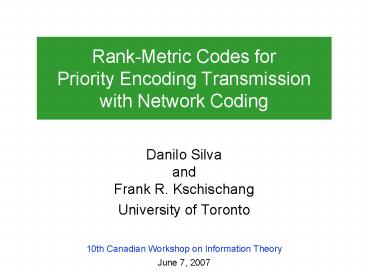RankMetric Codes for Priority Encoding Transmission with Network Coding
1 / 22
Title:
RankMetric Codes for Priority Encoding Transmission with Network Coding
Description:
Danilo Silva. and. Frank R. Kschischang. University of Toronto ... [D. Silva and F.R. Kschischang, 'Using rank-metric codes for error correction in ... –
Number of Views:175
Avg rating:3.0/5.0
Title: RankMetric Codes for Priority Encoding Transmission with Network Coding
1
Rank-Metric Codes forPriority Encoding
Transmissionwith Network Coding
- Danilo SilvaandFrank R. Kschischang
- University of Toronto
2
Outline
- Motivation
- Priority Encoding Transmission
- Random Network Coding
- What happens when we combine both?
- A rank-metric approach
- Conclusions
3
Priority Encoding Transmission
- Approaches to erasure correction (packet loss)
- Rateless codes/retransmission
- requires acknowledgement
- introduce delay
- Classical erasure codes
- rate decided a priori
- bandwidth waste if rate smaller than capacity
- low performance if rate higher than capacity
4
Why Priority Encoding Transmission?
- Priority encoding transmission
- better trade-off between performance and rate
- requires source signal than can be partitioned
into layers of unequal importance - apply unequal error protection to layers
5
Priority Encoding Transmission
- Deterministic PET
- Input layers Li with priority levels ki n
(smaller ki higher importance) - Output n packets such thatany K of these
packets are sufficient to recover all layers that
have priority level K
A. Albanese et al., Priority encoding
transmission, 1996
6
Priority Encoding Transmission
- Example
layers
packets
encoding(MDS code)
7
Random Network Coding
- Network coding
- Generalizes routing in communication networks
- Can increase the throughput of traditional
networks (achieves the multicast capacity) - Random network coding
- A practical way to perform network coding
- Many practical advantages over solutions based on
routing
Ho et al., A random linear network coding
approach to multicast,
8
Random Network Coding
- Each block (generation) of the information stream
is partitioned into n packets - Nodes form outgoing packets as random linear
combinations of incoming packets
9
Erasures in Network Coding
- What if not enough packets can reach the
destination? - An erasure in network coding is more severe than
a classical erasure since one erased packet may
contaminate other packets - Classical erasure correcting codes will not work!
no packets canbe recovered!
10
Combining PET and Network Coding
- One possible solution to combine PET and RNC
- P.A. Chou, Y. Wu, and K. Jain, Practical
network coding, 2003 - However, the guarantees are probabilistic.
11
Combining PET and Network Coding
- Example in
k2
nonsingular
linearlyindependent
linearly dependent
12
Combining PET and Network Coding
- Our goal
- Obtain a deterministic PET system that is
compatible with network coding - Observation
- Classical erasures are special cases of network
coding erasures ? must use MDS codes - Approach
- Are there MDS codes that can also correct network
coding erasures?
13
Traditional FEC and Network Coding
- Suppose packets are encoded with a RS code
message
codeword
transmittedpackets
14
Traditional FEC and Network Coding
- After packet mixing and one packet erasure
received packets
not necessarily invertible!e.g., in
15
Linearized Polynomials
- Is there a polynomial f(x) that satisfies...?
- If this is true, then
are three evaluation points for f(x)
16
Linearized Polynomials
- Linearized polynomials
- The property that gives their name
- An evaluation of a linearized polynomial is a map
from to itself that is linear over
17
Gabidulin Codes
- Encoding packets with a Gabidulin code
encoder
message
codeword
transmittedpackets
18
Decoding Gabidulin Codes
- After packet mixing and one packet erasure
q3 distinct evaluation points for f(x) of degree
lt q3
can find f(x) using Lagrangian interpolation
19
Rank-Metric Codes
E.M. Gabidulin, Theory of codes with maximum
rank distance, Probl. Inform. Transm., 1985
20
A Rank-Metric PET System
- Main implications
- Need m symbols in to make a symbol in
- Field size is exponentially larger
- Example
21
A Rank-Metric PET System
- Can also correct errors introduced by a jammer
all received packets are corrupt
only one rank error
D. Silva and F.R. Kschischang, Using
rank-metric codes for error correction in random
network coding, ISIT 2007
22
Conclusions
- Combining PET and RNC is a promising approach to
low-latency multicast - Existing PET systems are either probabilistic or
incompatible with RNC - We propose a PET system based on rank-metric
codes that is compatible with RNC and provides
deterministic guarantees of recovery - Our system can also correct packet errors
introduced by a jammer































